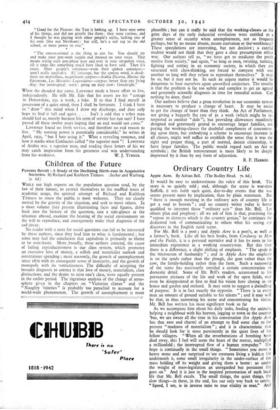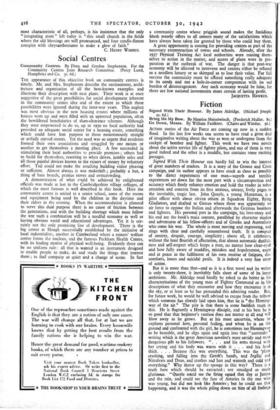Ordinary Country Life
Apple Acre. By Adrian Bell. (The Bodley Head. 75. 6d.) IT would be easy to underestimate the value of this book. The story is so quietly told ; and, although the scene is war-time Suffolk, it sets forth such quiet, day-to-day events that the wal seems present more by implication, than by plain statement. But "there is enough meaning in the ordinary acts of country life to get a soul to heaven " ; and no country writer today is better qualified to interpret those "ordinary acts" than Mr. Bell. Let others plan and prophesy : all we ask of him is that, practising the "repose in alertness which is the country genius," he continues the dedicated task of communicating to others what his seeing eye discovers in the English rural scene.
For Mr. Bell is a poet ; and Apple Acre is a poet's, as well as a farmer's, book. Like all his best books, from Corduroy to Men and the Fields, it is a personal narrative and it has its roots in his immediate experience as a working countryman. But this time there is a difference, a slight shifting of emphasis. "The spade is the microcosm of husbandry"; and in Apple Acre the emphasis is on the spade rather than the plough, the goat rather than the cow, the family-holding rather than the farm. Such a narrowing of the scene has necessarily entailed a certain concentration on domestic detail. Some of Mr. Bell's readers, accustomed to his persuasive pictures of the life and work of the open fields, may even be disappointed at first to find his vision here closing in on house and garden and orchard. It may seem to suggest a dwindling of purpose. It is in fact exactly the opposite. "There is to every man an amount of ground suitable to his talents " ; and it may well be that, in thus narrowing his scene and concentrating his vision, Mr. Bell has written his most significant book so far As we accompany him about his daily tasks, feeding the animals, helping a neighbour with his harvest, jogging to town in the country 'bus, we are aware all the time in his conversation (for Apple Acre has that ease and charm) of an attempt to find some clue to the present "madness of materialism " ; and it is characteristic that he should look for' it most persistently in the quiet lives of his fellow villagers. "When all the reverberations of bombing have died away, this I feel will seem the heart of the matter, multiplied a tnillionfold ; the interrupted flow of a human sympathy." His hope is continually in the small things. "Sometimes you move 3 heavy stone and are surprised to -see creatures living a hiddtm life underneath it, some small irregularity in the under-surface of the mass holding off its weight and giving them a home: so under the weight of mass-legislation an unregarded but persistent life goes on." And it is just in the inspired presentation of such local life that Mr. Bell excels. The small things, the quiet things, the slow things—in these, in the end, lies our only way back to sanity. "Speed, I see, is in inverse ratio to true vitality in man." And
most characteristic of all, perhaps, is his insistence that the only "integrating atom" left today is "this small church in the fields where the old blessings are still pronounced, and four candle-flames conspire with chrysanthemums to make a glow of faith."
C. HENRY WARREN.



























 Previous page
Previous page